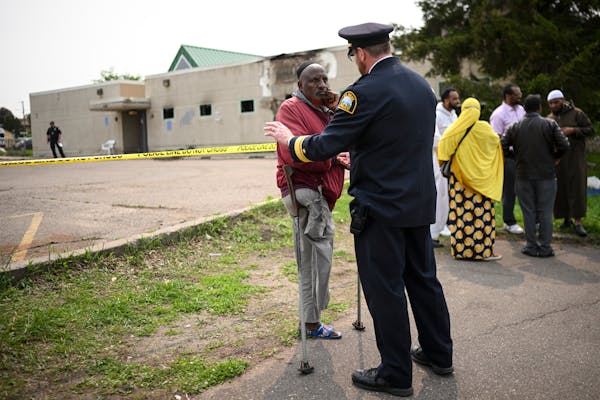Prosecutors have charged a 42-year-old man with arson two days after a fire inside a St. Paul mosque caused $250,000 in damages and marked the sixth time such houses of worship have been targeted this year.
Said Murekezi faces charges of second-degree arson, second-degree burglary and possession of methamphetamine in connection with a May 17 blaze at St. Paul's Oromo American Tawhid Islamic Center. Prosecutors asked Murekezi's bail to be set at $200,000 and say there was no evidence connecting the incident to a crime of bias.
"We welcome any arrest in this situation because our community [learned] from the previous incidents that we really need to act quickly to make sure that the suspect in this case is not going to other mosques," said Jaylani Hussein, executive director of the Minnesota chapter of the Council on American-Islamic Relations (CAIR-MN).
According to the charges, the center has been used as mosque office space since 2021. Three weeks ago the building was vandalized by someone who broke one of the windows, and staff had not used the building since. A bus driver for a Head Start school, located next to the center, saw somebody throw something through one of the mosque windows a day before the fire.
Murekezi told ATF agents after his arrest that he broke into the building the day before to stay overnight and look for things to burn. He admitted to investigators that he started the mosque fire, adding that he ensured nobody was in the building and said that what he did was "fun."
The arson was a form of protest for Murekezi, according to charging documents.
He identified as Muslim, and said he burned the building in protest for other Muslims and Americans who must sleep outside in the cold.
"He said that the building is not serving anyone, but the people need it," the documents read. "Murekezi stated it was a good thing he was caught, because if he was not caught, he would 'torch another one' or 'a church.' "
According to interviews with Murekezi, his plans were specific. He said he intended to burn the Islamic Da'wah Center in St. Paul as well as an unknown mosque in Mankato, and admitted that he goes to those mosques often to rob money from their donation boxes.
Murekezi's plans to "bring about change" went further. He told investigators that he hates terrorism but is becoming a terrorist.
"He stated people may get hurt or killed with these ideas, and that it would be messed up," the charging documents continued.
Murekezi's first court appearance was set for Friday. His criminal history dates back years.
Officials say Murekezi was charged with arson in 2020 for allegedly setting fire to a pile of clothes in his apartment. He barred firefighters from entering the room, and threatened to jump out of the fourth-floor window before he was taken into custody. At the time, he agreed to be taken to the hospital for a mental health evaluation.
Murekezi was also arrested in 2020 for threatening his neighbors with a knife, accusing them of being too loud and saying that he would "hurt them" if the noise continued. He was arrested and pleaded guilty to threats of violence, earning him a yearlong sentence that was postponed. The case was dismissed and Murekezi was discharged two years later because he had served time for the sentence by then.
Charging documents say that Murekezi broke windows at an Islamic community center in Minnetonka in 2021 and at a Catholic church in Minneapolis in 2023. He was in the Hennepin County jail between April 28 and May 15, and he was on probation for criminal damage to property when police arrested him Wednesday.
The fire he allegedly set at the Oromo American Tawhid Islamic Center this week set Minnesotan Muslims on edge, and marked the sixth such incident at a mosque this year, including arson and attempted arson and broken doors and windows at mosques in Minneapolis and St. Paul.
Hussein said he and others met with members of Gov. Tim Walz's staff on Thursday to request at least $7.5 million in emergency funding for mosques, synagogues and places of worship. Those funds could help secure at least 150 houses of worship with gear such as surveillance cameras and lighting.
Staff writer Paul Walsh contributed to this report.

Want to share info with the Star Tribune? How to do it securely

'Safe recovery sites' would offer syringes, naloxone and more to people using drugs. The plan could be in peril.
New Minnesota GOP leaders seek peace with party's anti-establishment wing

Who is Republican Lisa Demuth, Minnesota's first House speaker of color?

